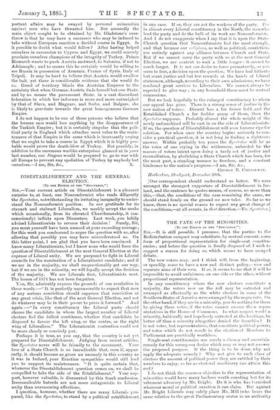DISESTABLISHMENT AND THE GENERAL ELECTION.
[TO THE EDITOR OF THE "SPECTATOR.']
Sra,—Your current article on Disestablishment is a pleasant surprise to, at least, one Nonconformist who reads diligently the Spectator, notwithstanding its irritating incapacity to understand the Nonconformist position. In our gratitude for its staunch and stalwart Liberalism, we meekly accept the snubs which occasionally, from its elevated Churchmanship, it (unconsciously) inflicts upon Dissenters. Last week, you loftily advised Liberationists to reverse their decision ! Surely, Sir, you must yourself have been amazed at your exceeding courage; for this week you condescend to argue the question with us, after allowing that possibly you may have misunderstood us. On this latter point, I am glad that you have been convinced. I 'know many Liberationists, but I know none who would force the question of Disestablishment at the next General Election at the expense of Liberal unity. We are purposed to fight in Liberal councils for the nomination of a Liberationist candidate ; and if we are in the majority, we shall unquestionably get our way, but if we are in the minority, we will loyally accept the decisiou of the majority. We are Liberals first, Liberationists next. The lesson of 1874 has not been forgotten.
You, Sir, admirably express the grounds of our resolution in these words :—" It is perfectly unreasonable to expect that men of any serious conviction should suppress that conviction at any great crisis, like that of the next General Election, and not do whatever may be in their power to press it forward." Aud again :—" In every constituency the Liberal party should choose the candidate in whom the largest number of Liberal electors feel the fullest confidence, whether that candidate be disposed to favour the left wing, or the centre, or the right wing of Liberalism." The Liberationist contention could not be more clearly or concisely put.
Perhaps it is true, as you say, that the country is not yet prepared for Disestablishment. Judging from recent articles. the Spectator never will be friendly to the movement. Your love of a State Church is so ineradicable that, even if, apparently, it should become as gross an anomaly in this country as it was in Ireland, your Erastian sympathies would still lead you to support its maintenance. " It is quite certain that, whenever the Disestablishment question comes on, we shall be compelled to take the aide of the Establishment." Your support, however valuable, is discounted by this frank confession. Irreconcileable hatreds are not more antagonistic to Liberal unity than unreasoning affections.
I question, however, whether there are many Liberals prepared, like the Spectator, to stand by a political establishment in any case. If so, they are not the workers of the party. For in almost every Liberal constituency in the North, the men who lead the party and do the bulk of its work are Nonconformists. And 1 do not exaggerate when I say that it is upon the StateChurch question that Nonconformists feel the most strongly, and that because our religious, as well as political, convictions are entirely against any alliance between Church and State. But if we cannot carry the party with us at the next General Election, we are content to wait a little longer— it cannot be much longer. It is not our desire to force prematurely, as you seem to fear, a decision upon the question. We have had hitherto but scant justice and but few rewards at the hands of Liberal statesmen, although, according to their own admissions, we have rendered great services to Liberalism. We cannot always be expected to give way ; iu any household there must be mutual concessions.
But we look hopefully to the enlarged constituency to whom our appeal has gone. There is a strong sense of justice in the new nation of voters. Dissent has a far firmer hold, and the Established Church a far feebler grasp of them, than the Spectator supposes. Probably almost the whole weight of the newly enfranchised will be cast in on the side of LiberationistsIf so, the question of Disestablishment will soon become ripe for solution. For when once the country begins seriously to consider a practical question, it is not long in finding a righteous answer. Within probably ten years the Spectator will be as the voice of one crying in the wilderness, unheeded by the masses of voters intent upon doing a tardy act of justice and reconciliation, by abolishing a State Church which has been, for the most part, a standing menace to freedom, and a constant hindrance to the nation's progress.—I am, Sir, &c., GEORGE E. CliEEsEMAN. Hatherlow, Stockport, December 291h.
[Our correspondent should understand us better. 1Ke were amongst the strongest supporters of Disestablishment iu Irelaud, and the sentence he quotes means, of course, no more than this,—that, the conditions of the case remaining the same, we should stand firmly on the ground we now take. So far as we know, there is no special ressoa to expect any great change of the conditions,—at all events, in that direction.—ED. Spectator.]










































 Previous page
Previous page